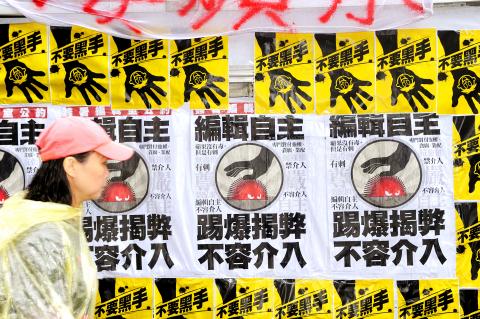|
Commentators warn of Chinese
influence on media
By Lee Yu-hsin and Stacy Hsu / Staff reporter, with Staff writer

An employee of Taiwan’s Next
Media walks past anti-sale banners during a demonstration outside the company’s
offices in Taipei yesterday. Workers oppose the planned sale of Hong Kong-based
Next Media’s Taiwan units to three Taiwanese businessmen.
Photo Sam Yeh, AFP
Cheng Hung-yi (鄭弘儀), the former host of
popular political television program the Talking Show (大話新聞), yesterday raised
concerns over the drastic changes in and sinicization of Taiwan’s media
environment, which he said could jeopardize the nation’s freedom of the press.
The talk show was suspended in May by SET-TV, allegedly due to its
pro-localization stance and harsh criticisms of China.
“Recent changes in Taiwan’s media environment have been unsettling, particularly
the stifling of pro-localization voices and apparent leaning toward Chinese
government mouthpieces, such as the People’s Daily, Xinhua news agency and the
China Central Television,” Cheng said.
Cheng said these changes could be seen in the growing domination of pro-China
rhetoric in Taiwan’s printed outlets, as well as the Taiwanese media’s staying
mum on China-related issues.
“People could see this China favoritism in local [Taiwanese] newspapers each day
during the Chinese Communist Party’s 18th Party Congress,” Cheng added.
Cheng made the remark on the sidelines of the launch of political commentator
Chung Nien-huang’s (鍾年晃) new book, My Talking Life (我的大話人生), yesterday in
Taipei. Chung was a regular guest on the Talking Show.
The event was also attended by Ellen Huang (黃越綏), a former national policy
adviser to former president Chen Shui-bian (陳水扁), and the director of the
Democratic Progressive Party’s Democracy Academy, Ho Po-wen (何博文).
Chung said Chinese influence had permeated the operations of the talk show long
before it was suspended.
In his new book, he revealed that the management of SET-TV had gradually put
restrictions on the talk show, which used to trumpet its pro-localization
stance.
“At first, the head of the TV station, citing his business ties with Chinese
firms, asked the program to tone down its criticisms of China. Then, the show
was forbidden from making any reference to issues pertaining to Tibet, the 1989
Tiananmen Square Massacre and Falun Gong,” Chung said.
“The interference culminated with the program’s permanent suspension in May,”
Chung said, adding that the fall of the Talking Show was only the tip of the
iceberg.
“Chinese capital is now sinking its claws into more Taiwan-based television
stations, manipulating their operations and risking the freedom of the press
that Taiwanese pride themselves on,” he said.
Chung, a former journalist who used to work for the Chinese--language Apple
Daily, said the impact of increasing Chinese capital in Taiwanese media was
starting to be felt, giving as an example a proprietor of a China-based media
outlet he met three months ago who said he only read the Chinese-language
Liberty Times (Taipei Times’ sister paper) because “other Taiwanese papers were
not much different from [China’s] People’s Daily.”
“What the Taking Show faced is similar to what the country as a whole is facing,
and we are doomed to be swallowed and shut down by China, regardless of how good
the quality of our media is,” Chung said.
|
![]()
![]()
![]()